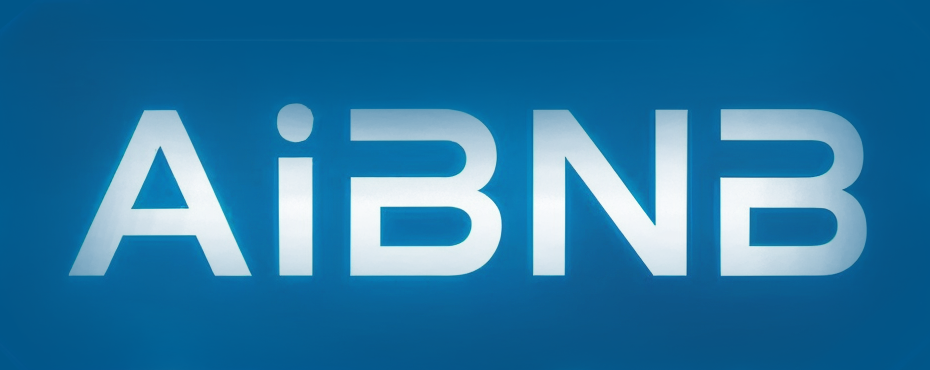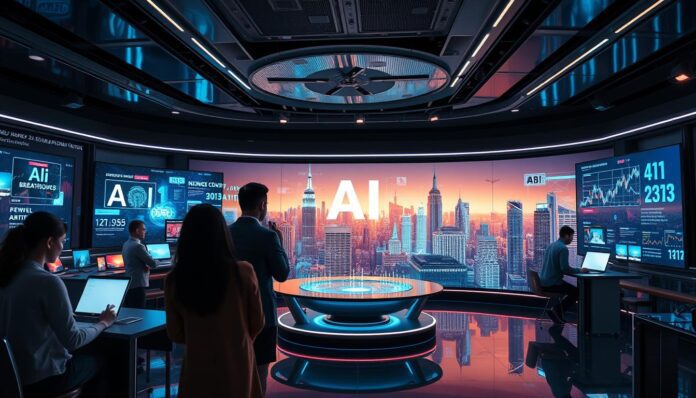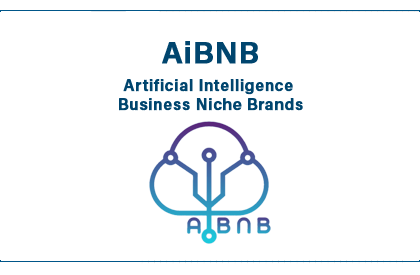Keeping up with the latest ai news is key in today’s fast world. Machine learning and deep learning are always changing. Artificial intelligence is growing fast, with neural networks leading the way in innovation.
From new generative AI to updates in rules, it’s important to know what’s happening in AI.
Studies show AI can improve sleep disorder diagnosis by analyzing videos. Deep learning can also find tumors in medical images. This shows how AI is changing healthcare.
AI has made big strides in the last 2 years. We’ll dive deeper into these advancements and their impact on machine learning and neural networks.
The Current State of AI: A Transformative Moment
Artificial intelligence trends are changing fast. Recent updates from OpenAI and advancements in generative AI are making a big impact. Large language models are being used in many ways, changing how businesses work.
Recent surveys show that 65% of companies are using generative AI regularly. This is almost double the number from just ten months ago. This growth is leading to new ideas and success in the industry. Most people think generative AI will bring big changes in the next few years.

Most companies using generative AI are doing so in marketing and sales, and in product and service development. Since 2023, the use of AI in marketing and sales has more than doubled. Now, 50% of companies use AI in two or more areas of their business, up from less than 33% in 2023.
Latest AI News: Groundbreaking Developments Reshaping Technology
The latest AI news is packed with exciting updates in autonomous systems and ai-powered robotics. Companies are now focusing on showing real benefits from AI investments. They are moving towards using AI in specific ways to improve their work.
By 2025, the pharma industry plans to use AI more, aiming to help patients and healthcare workers better. Those who started using AI early are aware of its challenges. So, companies will work to quickly and widely use AI to improve patient care.

In 2025, innovators will try out advanced AI models for better recommendations in healthcare. This will help target and deliver content more effectively to healthcare professionals. As AI ethics and regulation grow, it’s crucial to think about how these changes affect autonomous systems and ai-powered robotics.
OpenAI’s Latest Innovations: GPT Architecture Advances
OpenAI has been making big strides in artificial intelligence. They’ve made huge leaps in areas like agi developments, ai in healthcare, ai in finance, and computer vision. Their new o1 model is great at solving complex problems, helping developers create better ai tools for finance and healthcare.
OpenAI has also improved computer vision in their models. This means they can now analyze visual data better. This is a big win for healthcare, where ai can help doctors make more accurate diagnoses and tailor treatments. In finance, computer vision can spot fraud and make more accurate market predictions.
The o1-mini model shows OpenAI’s focus on making ai affordable and energy-efficient. It’s 80% cheaper than the o1-preview model. This makes it easier for developers to use ai in their projects, expanding its use in finance and other areas. With GPT-Next on the horizon, which will be 100 times more powerful than GPT-4, the possibilities for ai in healthcare, education, and research are endless.
OpenAI’s work is set to change many industries, including healthcare, education, and finance. As they continue to innovate, we can look forward to even more groundbreaking advancements in agi developments, ai in healthcare, ai in finance, and computer vision.
Machine Learning Breakthroughs: Neural Network Evolution
Recent advancements in machine learning have led to big breakthroughs in neural networks. Notable innovations include progress in reinforcement learning and ai research papers. The development of ai chips has also been key, making neural networks better at handling complex data.
Big tech companies have been leading these efforts. They are driving innovation and pushing the limits of artificial intelligence. This has opened up new possibilities for what we can do with ai.
The blending of physics, chemistry, and ai is a major focus. Researchers are looking into how these fields can help advance ai technologies. Changes in ai policies are also supporting the growth of ai-enabled polymaths. These individuals can connect theoretical advancements with practical ai applications.
The history of neural networks shows how computer science, theoretical chemistry, physics, and mathematics are connected. This history highlights the importance of interdisciplinary research in ai.
The introduction of transformer neural networks in 2017 has been a game-changer. It has led to big improvements in large language models, like GPT. However, current ai systems use a lot of energy, which is a concern for sustainability.
The brain works efficiently on about 20 watts. Researchers are working on making large language models smaller and more efficient. This will help create systems that are easier to understand and use less energy.
Places like Stanford are stepping up to meet these challenges. They are building new GPU clusters for research. This supports the development of ai chips and big tech projects.
Google’s AI Initiatives: DeepMind’s New Frontiers
Google’s AI projects, like those from DeepMind, are exploring new limits in artificial intelligence. They’ve published over 300 research papers on safety and responsibility in the last year. This shows DeepMind’s leading role in ai cybersecurity.
The 2024 Responsible AI Progress Report shows Google’s dedication to ai in education and synthetic media. Google is also focusing on integrating ai startups into different fields. This includes making operations more efficient for retailers and improving student learning outcomes.
The company has introduced the Frontier Safety Framework. They’re working with experts to assess risks and find ways to mitigate them. This shows Google’s commitment to developing ai responsibly.
Google’s AI tools, like those shown at BETT 2025, aim to speed up education and enhance learning. The Generative AI Accelerator program and Project Relate, an Android app for those with non-standard speech, show Google’s aim to use ai for good. As ai grows, Google’s efforts will be key in shaping its future.
AI in Healthcare: Revolutionary Diagnostic Tools
Artificial intelligence is changing healthcare with new diagnostic tools. AI-generated content, like medical images, helps doctors spot diseases better. Multimodal AI, which uses different data types, also boosts diagnosis and treatment.
Research shows AI can match or beat human doctors in diagnosing from images. This is true across many medical fields.
The possibilities for AI in healthcare are endless. It can help find new drugs, offer virtual consultations, and monitor health. Quantum AI quickly analyzes big data, making it useful in healthcare too. By 2025, AI will manage over 85% of healthcare customer interactions.
Studies show AI can greatly improve healthcare. Generative AI has improved patient results by up to 45% in trials. AI algorithms, like Eko Health’s, could cut undiagnosed heart issues by up to 30%.
AI is expected to lower healthcare costs. McKinsey & Company says generative AI could cut U.S. healthcare costs by up to $150 billion a year by 2026.
The Regulatory Landscape: New AI Governance Frameworks
The world of AI regulation is changing fast. New rules and policies are popping up everywhere. The 2024 NAVEX State of Risk and Compliance Report shows 56% of companies will use Generative AI in the next year. This highlights the need for good AI rules.
AI is also creating more jobs. Companies are using AI to manage their supply chains and inventories. This has led to big gains in marketing and sales.
There’s a growing focus on AI ethics. The EU AI Act sorts AI systems by their impact on rights and safety. Breaking these rules could cost up to €35 million or 7% of global revenue. This shows how crucial it is to have responsible AI rules.
ESG reporting is becoming more important too. It means AI systems must follow environmental, social, and governance standards.
As AI jobs increase, companies face a complex regulatory world. They must follow current laws and new AI rules. The EU AI Act will set a high standard for AI rules globally.
With the EU AI Act coming, companies must focus on AI ethics and governance. This is key to staying competitive worldwide.
Startup Spotlight: Emerging AI Companies to Watch
Recent ai news shows the global AI infrastructure market is set to hit over $100 billion by 2028. This surge is thanks to machine learning and deep learning breakthroughs. These advancements are changing many industries with the help of neural networks.
Several new AI companies are playing big roles in this growth. For instance, Writer, Safe Superintelligence, and Physical Intelligence are on CRN’s list for 2025. They use ai news and machine learning to create new solutions. DevRev, another startup, got $100.8 million in funding and has over 1,000 customers.
The AI world is booming, with over 118,000 organizations and 62,000 new AI companies in five years. Most of these companies started in 2020, and they get about $6.2 million in funding per round. As the industry grows, we’ll see even more new ideas and progress in deep learning and neural networks.
AI Ethics and Safety: Recent Developments
Recent advancements in artificial intelligence have raised concerns about ethics and safety. The growth of large language models and generative AI has led to risks. These include AI systems leaking confidential information and sending offensive messages.
Researchers have proposed new ways to address these issues. The Alignment Studio aims to align large language models with ethical guidelines. This includes contextual regulations.
Openai updates have also focused on making AI safer and more ethical. A new framework called RADAR has shown better performance in detecting AI-text. Researchers at Google DeepMind found that AI-generated outputs can be as persuasive as human arguments. This highlights the need for better detection tools.
The psychological impact of AI on human workers is a concern. It can lead to lower self-worth and violations of human rights. Companies like Google have set AI principles and published annual transparency reports.
These guidelines now allow for exceptions in AI use for national security and surveillance. This shows ongoing policy refinements.
Enhanced risk mitigation techniques have been developed for generative AI. The revised policies focus on increased security to address exfiltration risks. As AI trends evolve, prioritizing ethics and safety is crucial. This ensures the responsible development and use of AI systems.
Quantum Computing and AI: Convergence Updates
Recent breakthroughs in quantum computing are changing the game for AI, especially in healthcare and finance. Quantum computers can solve complex problems in minutes, unlike classical computers. For example, the Variational Quantum Eigensolver (VQE) algorithm is helping in drug development by calculating molecule energies.
Quantum computing and AI together are making image processing faster and more accurate. Governments and private investors have poured almost $40 billion into quantum tech since 2021. The National Institute of Standards and Technology has also set new security standards, showing quantum’s importance in defense and the economy.
As quantum computing advances, we’ll see big leaps in AI for finance and healthcare. Google DeepMind and Quantum AI teams are working together to improve quantum computing. Quantum’s ability to solve problems quickly is set to transform many industries, making it an exciting time for AI and computer vision.
Enterprise AI Adoption: Success Stories and Challenges
Companies are diving into artificial intelligence, thanks to ai research papers and policy changes. Big tech is at the forefront, showing big gains. Over 40% of firms now spend more than $10 million on generative AI, up from $1-5 million last year.
The rise of ai chips has been key. They handle big data fast, making AI more powerful. For example, DeepSeek’s R-1 model can process 250 tokens per second, much faster than humans.
Despite hurdles, many are seeing success with AI. A survey found 72% of companies plan to invest more in AI by 2025. And 90% of leaders think AI boosts employee skills. With AI costs dropping, the benefits are becoming clear, with many seeing big returns.
The Road Ahead: Shaping Tomorrow’s AI Landscape
The AI revolution is still growing, bringing both great opportunities and challenges. Companies like OpenAI, Google DeepMind, and Anthropic are exploring new frontiers in machine learning. They are working on models like OpenAI’s Omega and safety features in Anthropic’s Claude-Next.
Autonomous vehicles are also on the horizon, set to change how we travel. They could cut traffic deaths by up to 90%. But, there are worries about making AI education fair for everyone. The gap in AI skills is getting bigger.
The European Union’s AI Act is coming in 2025. It will set rules for AI use, making sure it’s safe and transparent. This law will help guide how AI is used in different fields. It’s crucial to teach more people about AI, especially in places where jobs are growing.
The future of AI looks exciting, with new startups and innovations on the way. But, there are also big challenges like the cost of computing and working together on AI projects. As AI grows, we must use it wisely and fairly. We need to make sure everyone can benefit from it.




